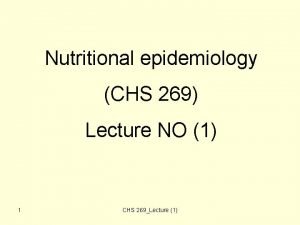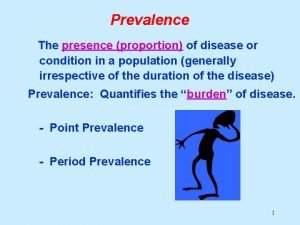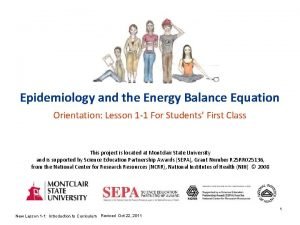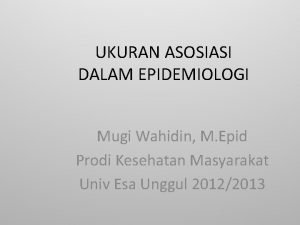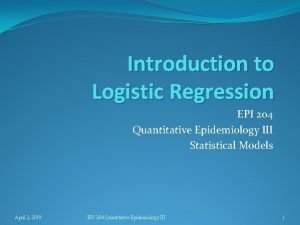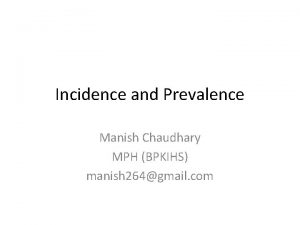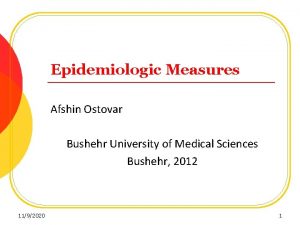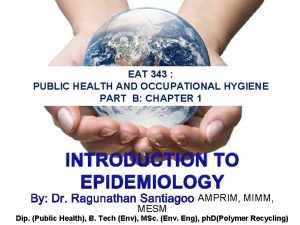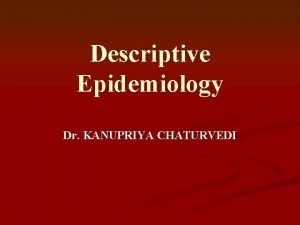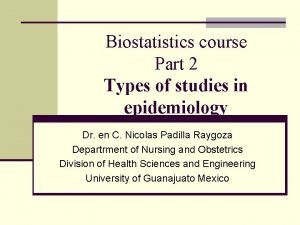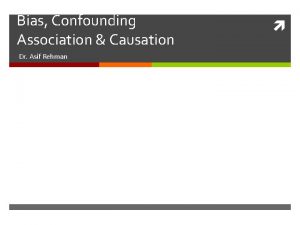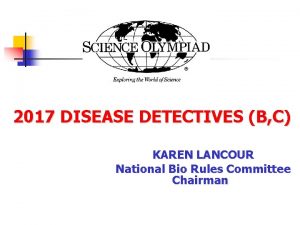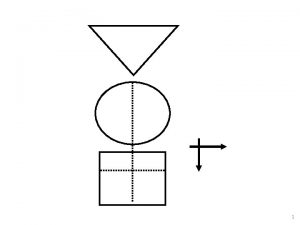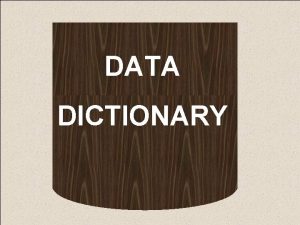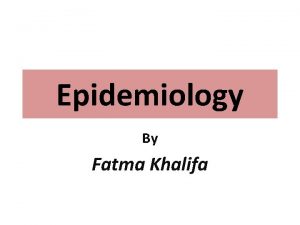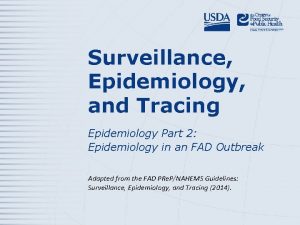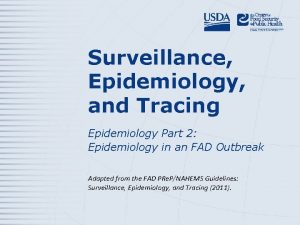What is Epidemiology 1 Dictionary definition of epidemiology


















- Slides: 18

What is Epidemiology? 1

Dictionary definition of epidemiology A term derived from the Greek: epi : on, upon demos : the people logos : the study of (Webster's Unabridged Dictionary) 2

Professions in the study of diseases and health Pathologist Doctor Epidemiologist

Reasons to Learn Epidemiology 1. Learn new ways to understand important, real world questions about your health and the health of others 2. Gain knowledge to make more informed choices about your personal health 3. Improve science literacy o Research skills o Reasoning skills o Understanding of media reports 4. Be more empowered as a citizen in a democracy to make public health decisions 5. Find out more about other public health career paths besides being a doctor or a nurse 4

An epidemiologist is a scientist who specializes in tracking the occurrence and cause of disease Epidemiologists help answer how and why diseases occur among a population in order to control and prevent diseases. 5

Detectives Investigate crimes Look for clues at a crime scene Judge quality of evidence Form hypotheses Identify suspects Present evidence in court Help control crime Epidemiologists Investigate diseases Look for clues in the community Judge quality of evidence Form hypotheses Identify suspected causes Present evidence in scientific journals and at scientific meetings Help control disease

What do epidemiologists look like? 7

The Community is the epidemiologists’ laboratory 8

Natural Experiment An observational study that takes advantage of a naturally occurring event or situation that can be used by a researcher to answer a particular question. Natural experiments are often used to study situations in which a true experiment is not possible, 9

Observational Study An epidemiological study of a natural experiment in which the investigator is not involved in the study other than to record, classify, count, and analyze results. 10

An Adult Definition of Epidemiology . . . the study of the distribution and determinants of healthrelated states or events in specified populations and the application of this study to the control of health problems. (Gordis, 2004) A Middle-School Definition of Epidemiology. . . the study of populations in order to determine the patterns and causes of health and illness, and to be able to apply the learned information to the control of health problems. 11

A working definition of the science of epidemiology Epidemiology is the study of populations in order to determine the patterns and causes of health and illness, and to be able to apply the learned information to the control of health problems. 12

A working definition of the science of epidemiology Epidemiology is the study of populations in order to determine the patterns and causes of health and illness, and to be able to apply the learned information to the control of health problems. 13

A working definition of the science of epidemiology Epidemiology is the study of populations in order to determine the patterns and causes of health and illness, and to be able to apply the learned information to the control of health problems. 14

A working definition of the science of epidemiology Epidemiology is the study of populations in order to determine the patterns and causes of health and illness, and to be able to apply the learned information to the control of health problems. 15

Three main areas that epidemiology tries to address Patterns Causes Control of Health Problems Population patterns in health-related behaviors and in health and illness Causes of health and illness in populations Possible strategies and actions that can change the patterns of health and illness in populations 16

Thinking like an epidemiologist. . . Health and disease are not distributed haphazardly in a population. There are patterns to their occurrence. We are affected by many things around us – things we can control and things we can’t control. Epidemiology studies how peoples’ lives and health are affected by things that impinge upon us. It finds clues and answers by looking at large numbers of people. 17

Skills for epidemiology • Interest in investigations and solving mysteries • Critical thinking • Analytical/mathematical skills • Enjoyment in working with people • Team player 18
 Define nutritional epidemiology
Define nutritional epidemiology Meaning of epidermiology
Meaning of epidermiology Prevalence
Prevalence Epidemiology definition
Epidemiology definition Monkey denotation
Monkey denotation Global citizenship definition dictionary
Global citizenship definition dictionary Measures of association in epidemiology
Measures of association in epidemiology Logistic regression epidemiology
Logistic regression epidemiology Prevalence calculation
Prevalence calculation Cross sectional study advantages and disadvantages
Cross sectional study advantages and disadvantages Attack rate formula
Attack rate formula Difference between descriptive and analytic epidemiology
Difference between descriptive and analytic epidemiology Person place and time model in epidemiology
Person place and time model in epidemiology Difference between descriptive and analytical epidemiology
Difference between descriptive and analytical epidemiology Incidence vs prevalence
Incidence vs prevalence Pros and cons of cross sectional study
Pros and cons of cross sectional study Recall bias example
Recall bias example Attack rate calculation
Attack rate calculation Ramboman acronym
Ramboman acronym
